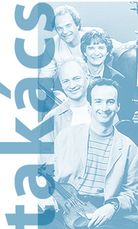
Date:
5 October 2004 at 20.00
Venue: Vancouver Playhouse
The Takács Quartet
First Violin:
Edward Dusinberre
Second Violin: Károly Schranz
Viola: Roger
Tapping
Cello: András Fejér
Programme: Bartók No. 3, Op. 85 / Borodin No. 2 in D major / Beethoven Op. 131, C-sharp minor

The Friends of Chamber Music have a well-deserved reputation for bringing the very best in classical music-making to Vancouver. The opening of the society's 57th season once again showed its unerring good nose for talent, and on offer was diverse and consistently interesting programme by Colorado-based Takács Quartet, one of the quartet scene's established treasures.
Bartók's brief but ever-demanding String Quartet No. 3, Op. 85, is a daunting season opener, a bold choice, making serious demands on listener and performer alike from its first bars. Typically Modernist in its angry beginning, intensely cerebral throughout, it grudgingly blossoms into warmer, more melodic territory, relying on folk melodies, much transformed, of Bartók's Hungary.
The battle royal for central place of the soundscape ends in a fusion of Modernist and traditional motifs, though parody lurks in the background. Typically Hungarian colours and the lyric impulse make a stand against aggressive and rebarbative modernist sounds. The quartet offered a well shaped, authoritative reading, supported by a technique no less bravura in its assurance and accomplishment.
Borodin's heart-on-sleeve Romanticism, wholly Russian in character, offered a startling contrast to the opening quartet. Here, generous thematic material and honey-toned lyricism are the order of the day. Sprightly and bristling with joie de vivre the soundscape is the very reverse of of nineteenth-century high seriousness.
The Scherzo movement 's waltz comfortingly suggests just how right things can be with the world, the graceful and delicate playing confirming the musical statement. The famous Notturno, a lyrical effusion of self-conscious beauty, was a study in miniature of the whole quartet ethos, drawing out practiced playing and a supreme gentleness of touch. The headlong sprint of the closing Andante, with demanding tempi and flashes of fire was a dazzling explosion of sound, rollicking and youthfully exuberant.
The masterwork on the programme was inevitably Beethoven. Opus 31 with its grand dignity of statement begins in depthless melancholy that moves to assurance and human dignity in the Finale. A work of wildly shifting moods and contrastive character, this is a major musical statement that on its outing by Takács Quartet received a colourful, highly characterized performance. The palpable sense of concentration was evident, whether in flashy moments or serious and restless ones, as the dynamics shifted throughout.
The Takács Quartet, established nearly thirty years ago, offers both authoritative and vigourous. Intense in a traditionally alte Europaischer fashion, its long residence in the US has no doubt allowed it to maintain a robust youthfulness. The performing skills on show had the strengths of well-aged, lovingly produced wine: there was a bright, young finish on top, while smoky depths lurked below.
© 2004 J. H. Stape